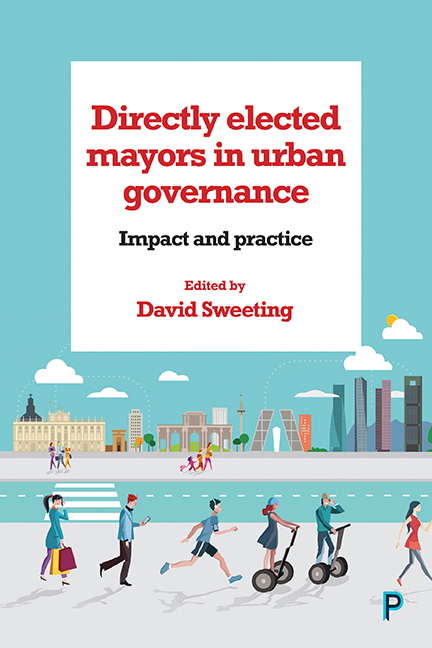two - Mayoral governance in Bristol: has it made a difference?
Published online by Cambridge University Press: 05 April 2022
Summary
Introduction
Bristol introduced a directly elected mayor model of governance in November 2012. This radical reform replaced the former system whereby the leader of the council was selected from among the 70 elected councillors in the city. This chapter situates the Bristol reforms in context, introduces a new conceptual framework for understanding urban leadership, analyses the impact of the new system as recorded in before and after surveys of the views of citizens and civic leaders, and identifies themes emerging from the research on Bristol that could be of relevance to the wider international debate about how to improve the leadership of urban governance. The chapter draws on ongoing action research on urban governance in Bristol and the Bristol city region. However, the authors are also long-time residents of the city and have been active in debates about local democracy in the city for many years. The narrative is informed by this tacit knowledge of governance and community politics in the city as well as the hard data generated by systematic research on the mayoral model of governance.
A directly elected mayor for Bristol – the local context
The UK Conservative and Liberal Democrat coalition government, elected in 2010, moved swiftly to pass the Localism Act 2011. This measure was intended to spur English cities to introduce directly elected mayors: it required the 12 largest cities in England to hold referendums on whether or not to adopt a directly elected mayor model of governance (Fenwick and Elcock 2014). In the event, ten referendums were held in May 2012 as two cities – Liverpool and Salford – opted to introduce mayoral governance using existing legislation. In nine cities local citizens rejected the mayoral form of governance. Bristol was the only city to vote ‘yes’ and the fact that the city chose a distinctive path generated national media interest. Citizens voted for the directly elected mayor model of governance by a margin of around 5,100 votes. On a turnout of 24%, 41,032 people voted for the mayoral model, while 35,880 voted against. The subsequent election, held in November 2012, attracted 15 mayoral candidates, more than in any other mayoral election in England. Some 90,273 votes were cast – a voter turnout of 28% – and an independent candidate, George Ferguson, won the contest, beating the Labour candidate, Marvin Rees, into second place.
- Type
- Chapter
- Information
- Directly Elected Mayors in Urban GovernanceImpact and Practice, pp. 19 - 34Publisher: Bristol University PressPrint publication year: 2017



